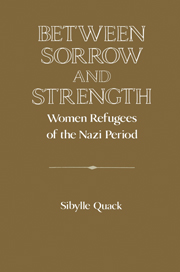Book contents
- Frontmatter
- Introduction
- Prologue: Jewish Women in Nazi Germany Before Emigration
- Part One A Global Search for Refuge
- 1 Jewish Women Exiled in France After 1933
- 2 Arrival at Camp de Gurs: An Eyewitness Report
- 3 Women Emigrés in England
- 4 England: An Eyewitness Report
- 5 Women Emigrés in Palestine: An Eyewitness Report
- 6 “Naturally, many things were strange but I could adapt”: Women Emigrés in the Netherlands
- 7 Refugee Women from Czechoslovakia in Canada: An Eyewitness Report
- 8 Women in the Shanghai Jewish Refugee Community
- 9 Shanghai: An Eyewitness Report
- 10 German-Jewish Women in Brazil: Autobiography as Cultural History
- 11 A Year in the Brazilian Interior: An Eyewitness Report
- Part Two Refuge in the United States
- Epilogue: The First Sex
- Index
3 - Women Emigrés in England
Published online by Cambridge University Press: 05 January 2013
- Frontmatter
- Introduction
- Prologue: Jewish Women in Nazi Germany Before Emigration
- Part One A Global Search for Refuge
- 1 Jewish Women Exiled in France After 1933
- 2 Arrival at Camp de Gurs: An Eyewitness Report
- 3 Women Emigrés in England
- 4 England: An Eyewitness Report
- 5 Women Emigrés in Palestine: An Eyewitness Report
- 6 “Naturally, many things were strange but I could adapt”: Women Emigrés in the Netherlands
- 7 Refugee Women from Czechoslovakia in Canada: An Eyewitness Report
- 8 Women in the Shanghai Jewish Refugee Community
- 9 Shanghai: An Eyewitness Report
- 10 German-Jewish Women in Brazil: Autobiography as Cultural History
- 11 A Year in the Brazilian Interior: An Eyewitness Report
- Part Two Refuge in the United States
- Epilogue: The First Sex
- Index
Summary
The topic of refugees, women or men, invariably arouses considerable interest. But this interest stands in inverse relationship to the knowledge people tend to have about refugees. Even refugees themselves often have no more than a vague understanding of their situation. This was certainly true when I started my own research, with which I had practically entered virgin ground way back in the late 1970s. In the meantime, to be sure, more empirical data have been collected, as is witnessed by the proceedings of the first major conference on “German-speaking Jews in the United Kingdom,” published in 1991. However, as that volume also shows, a lot of the work carried out in this field does not go beyond a catalog of German-Jewish “achievements” or a description of political developments. What is now needed, it seems to me, is a better understanding of the underlying processes of migration and its impact on the German-Jewish community as a whole and on its individual members in England and elsewhere. Let me therefore begin by raising a couple of points of a more theoretical nature that affect refugees in general before I examine women refugees in England in particular.
First of all, however, I would like to outline briefly the empirical basis for my observations. About 250 people were approached originally in a random way. About 180 of these were interviewed in the stricter sense. These respondents were divided into three main categories: representing the first (80 respondents), second (68 respondents), and third (32 respondents) generations. Those born up to 1920 were regarded as first generation. The second generation were those born between 1920 and 1945, and the third generation were those born after the war.
- Type
- Chapter
- Information
- Between Sorrow and StrengthWomen Refugees of the Nazi Period, pp. 69 - 80Publisher: Cambridge University PressPrint publication year: 1995
- 3
- Cited by



